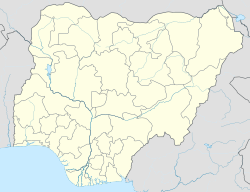Ekpoma: Difference between revisions
SuccessE.O (talk | contribs) Improved content Tags: Visual edit Mobile edit Mobile web edit |
SuccessE.O (talk | contribs) Made improvements Tags: Visual edit Mobile edit Mobile web edit |
||
| Line 80: | Line 80: | ||
== People == |
== People == |
||
The people are mainly of [[Esan people|Esan tribe]], and are predominantly academic and non-academic staffs of [[Ambrose Alli University]], owners of small scale medium enterprises (SME's), subsistence farmers and others which include civil service, trading, transportation and students of [[Ambrose Alli University]]. The people of Ekpoma are said to have originated from [[Benin]], |
The people are mainly of [[Esan people|Esan tribe]], and are predominantly academic and non-academic staffs of [[Ambrose Alli University]], owners of small scale medium enterprises (SME's), subsistence farmers and others which include civil service, trading, transportation and students of [[Ambrose Alli University]]. The people of Ekpoma are said to have originated from [[Benin]], their language is similar to that of Benin dialect except for some differences in the form of words and also their intonation or pronunciation may be a little different.<ref>{{Cite web|title=(PDF) Intra-group relations among Ekpoma Group of Villages, Edo State, Nigeria in the Pre-Colonial Era: A Historical Perspective|url=https://www.researchgate.net/publication/323390951_Intra-group_relations_among_Ekpoma_Group_of_Villages_Edo_State_Nigeria_in_the_Pre-Colonial_Era_A_Historical_Perspective|access-date=2021-07-16|website=ResearchGate|language=en}}</ref> |
||
The head of the town is known as or called the Onojie. This position is hereditary in which a son succeeds his father. The Onojie palace in an environment named Eguare. The village council comprises |
The head of the town is known as or called the Onojie. This position is hereditary in which a son succeeds his father. The Onojie palace is in an environment named Eguare. The village council comprises ohe Edion, also known as the Elders, led by most Eldest in the [[community]] known as the Odionwele. The ''Edion'' are responsible for trying cases and settle disputes in the community. Messages or Information are passed from the Onojie through the Okhaimon to the Odionwele who will call a meeting of elders in order to discuss rising matters.<ref>{{Cite web|title=(PDF) Succession Under Customary Law in Nigeria. The Rule of Primogeniture versus the Deposition of a Traditional Ruler (Onojie) in Edo State: A critique of the Provisions of the Traditional Rulers and Chiefs Edicts No 16 of 1979|url=https://www.researchgate.net/publication/336052031_Succession_Under_Customary_Law_in_Nigeria_The_Rule_of_Primogeniture_versus_the_Deposition_of_a_Traditional_Ruler_Onojie_in_Edo_State_A_critique_of_the_Provisions_of_the_Traditional_Rulers_and_Chiefs_E|access-date=2021-07-16|website=ResearchGate|language=en}}</ref> |
||
== Health == |
== Health == |
||
Revision as of 05:19, 18 September 2021
Ekpoma | |
|---|---|
Town | |
| Coordinates: 6°45′N 6°08′E / 6.750°N 6.133°E | |
| Country | |
| State | Edo |
| Time zone | UTC+1 (WAT) |
| Area code | 055 |
| Climate | Aw |
Ekpoma is a town in Edo State, Nigeria. It is the administrative headquarters of the Esan West Local Government Area. Ekpoma lies on the geographical coordinate of latitude 6°45′N 6°08′E / 6.750°N 6.133°E. The town has an official Post Office, and it is home to the Ambrose Alli University.[1]
Population
It has a population of over 290,000 people. It has an adult male population of over 90,000 and adult female population of over 80,000. It is politically divided into 10 wards and occupies a land mass of 502 km2 (194 sq mi).[2] Ekpoma alongside with Uromi are the prime towns of the Esan people. It has become a congregating centre for years, the Esan people from other towns have consistently taken residence in Ekpoma and Uromi. Ambrose Alli University is located in Ekpoma.
People
The people are mainly of Esan tribe, and are predominantly academic and non-academic staffs of Ambrose Alli University, owners of small scale medium enterprises (SME's), subsistence farmers and others which include civil service, trading, transportation and students of Ambrose Alli University. The people of Ekpoma are said to have originated from Benin, their language is similar to that of Benin dialect except for some differences in the form of words and also their intonation or pronunciation may be a little different.[3]
The head of the town is known as or called the Onojie. This position is hereditary in which a son succeeds his father. The Onojie palace is in an environment named Eguare. The village council comprises ohe Edion, also known as the Elders, led by most Eldest in the community known as the Odionwele. The Edion are responsible for trying cases and settle disputes in the community. Messages or Information are passed from the Onojie through the Okhaimon to the Odionwele who will call a meeting of elders in order to discuss rising matters.[4]
Health
The community enjoys a blend of traditional and orthodox medicine, with the presence of two general hospitals, some privately owned hospitals, and Government-owned health centers, and is also closely linked with Irrua Specialist Teaching Hospital, Irrua, where a lot of inhabitants visit to receive health care. Traditional bonesetters, traditional birth attendants, and herbal healers are also fairly distributed around the town setting. The caliber of staff commonly found at the health centers includes community health extension workers, nurses, auxiliary nurses and doctors. Services offered at these centers include health education, immunization, family planning counselling, treatment of minor ailments and first aid, referrals, and ante-natal.
References
- ^ "Post Offices- with map of LGA". NIPOST. Archived from the original on 2009-10-07. Retrieved 2009-10-20.
- ^ Okun, R., Okosun, M. (1990). An Overview of the Esan West Local Government. The journal for geographical placement for Ekpoma community. 15(4), 259-265
- ^ "(PDF) Intra-group relations among Ekpoma Group of Villages, Edo State, Nigeria in the Pre-Colonial Era: A Historical Perspective". ResearchGate. Retrieved 2021-07-16.
- ^ "(PDF) Succession Under Customary Law in Nigeria. The Rule of Primogeniture versus the Deposition of a Traditional Ruler (Onojie) in Edo State: A critique of the Provisions of the Traditional Rulers and Chiefs Edicts No 16 of 1979". ResearchGate. Retrieved 2021-07-16.


